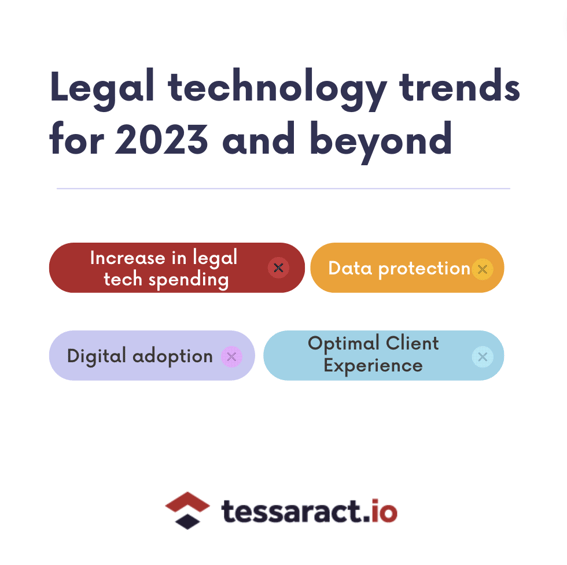The legal tech sector is constantly changing and evolving. In this blog, we'll cover key trends you can expect to see in the legal technology market from 2023 and the next few years.
Greater push towards digital adoption for legal firms
The legal industry today faces various pressing economic and societal transformations that highlight the inevitability of a digitally-driven future shaped by the following considerations:
- Data Connectivity: Our world today is increasingly influenced and shaped by data and connectivity
- Leverage Technology: Organisations and businesses are noticeably clearer in their intention to leverage technology and digital transformations to stay ahead of the competition.
- Digital Transformation: Leveraging technology and embarking on digital transformations – adopting relevant strategies and sustainable transformative practices on the same is not easy.
Thus, it has become necessary to move towards the digitalisation of practice management systems by adopting digital workflows. Currently, workflow automation technology for the legal industry is focused on making processes more efficient by relieving the burden of certain business processes and administrative tasks. Workflow automation tools are great for some of these time-consuming repetitive tasks, such as sending email reminders and scheduling meetings.
Legal tech spending is increasing
Law firms are accelerating their spending on legal technology, and this trend is expected to last into 2023 and beyond. According to Gartner's prediction, legal technology spending will increase to approximately 12% of in-house budgets by 2025, which is a threefold increase from 2020.
The demand for legal technology has remained consistent as law firms continuously find ways to streamline legal operations. Legal technology will remain an essential part of the legal industry, and law firms continue to invest money on tech that improves productivity and efficiency. This allows law firms to find new ways to automate handling documents through legal document management systems and reduce time spent on repetitive tasks and physical paperwork.
Data protection remains important
One trend that continues to be a high priority to modern law firms is the need for secure digital tools that keep confidential data safe. According to the The Washington Post, global financial losses for cybersecurity breaches exceed $1 trillion per year. Cybersecurity is critical to modern law firms, to ensure the secure transfer of information, storing protected client documents, and maintaining cyber-safe work practices. Furthermore, as many in-house legal departments and law firms shift to hybrid or remote work, your team needs to be even more aware of the cybersecurity risks it faces and how it can reduce them.
Legal technology will support companies in their management of cyber incidents with new cyber incident reporting tools, cyber incident response plan management and secure data sharing. Platforms outside of an organisation’s internal IT systems may be considered beneficial as they can be accessed if an attack happens and the organisation’s internal systems are compromised. As such, law firms need to explore secure technology options and offer them full compliance with all relevant cybersecurity and privacy regulations around the world. Maintaining compliance and reducing the risk of security breaches can help law firms and legal departments to offer the level of discretion that clients expect.
Emphasis on delivering the optimal client experience
Irrespective of industry, there is a need for every organisation to know their client (KYC) and understand their customer’s behaviors. to design offers and services that help optimise and nurture client relationships. Tracking data to build client insights helps to predict client behavior and what they need. Legal echnologies like practice management software make the client experiences like the client intake process more efficient and transparent.
Unsurprisingly, there is an increase in demand for flexible legal services. It is important that lawyers communicate with clients to determine their preferences in accessing legal services, which helps you better align with these expectations to deliver an optimal client experience and strengthen existing relationships. The key note is to take initiative rather than simply reacting to requests.
Keep up with the latest legal tech trends
With Tessaract, your law firm or your legal department can comfortably keep up to date with all of the latest legal tech in the market. Tessaract can help you to envision your their digital transformation roadmap and optimise your digital workflows. If you are ready to get started with Tessaract, you can request a comprehensive demonstration from our team.

